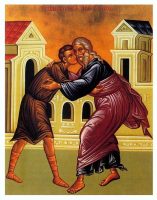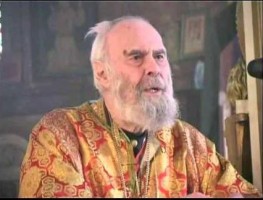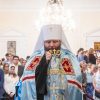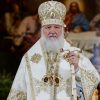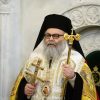September 11, 2009
A sermon by His Holiness Kyrill, Patriarch of Moscow and All the Russia, on the Beheading of the Prophet, Forerunner and Baptist John in the Cathedral church of the Savior in the Old Market in Nizhny Novgorod.
Your Eminences, dear Right Reverend hierarchs, fathers, brothers and sisters!
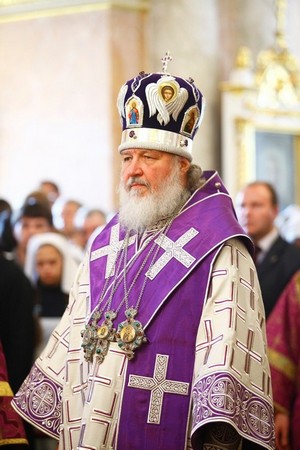 It is a great joy for me to celebrate the Divine liturgy together with my brethren, the bishops who have come from the dioceses of the Volga region, in this magnificent Cathedral of Nizhny Novgorod, to see the local Church united around its bishop, to see young faces, to hear the youth choir, to see many people, who perhaps have only recently entered Church life, but are conscious that they are members of the Holy, Catholic, Apostolic Orthodox Church, and to live the Mystery of the Holy Eucharist together with them.
It is a great joy for me to celebrate the Divine liturgy together with my brethren, the bishops who have come from the dioceses of the Volga region, in this magnificent Cathedral of Nizhny Novgorod, to see the local Church united around its bishop, to see young faces, to hear the youth choir, to see many people, who perhaps have only recently entered Church life, but are conscious that they are members of the Holy, Catholic, Apostolic Orthodox Church, and to live the Mystery of the Holy Eucharist together with them.
Today we recall a tragic event form the Gospel – the martyr’s end of the Prophet and Forerunner John. This is a day of mourning in the Orthodox Church calendar: we are not supposed to eat any food; bishops and priests wear the vestments which they wear on feast days in Lent. Together with the outward appearance of the clergy and the Gospel and Epistle readings, all this is as it were destined to remind us of the tragedy which took place. The Prophet, Forerunner and Baptist John was slain at the suggestion of Herod’s wife who could not forgive the Prophet for his denunciations that she was living illegitimately with her new husband, Herod, because she had previously been his brother’s wife. Of course, the Queen was conscious of her sin. If she had not been conscious of it, she would not have been in such a rage and her rage was such that she was prepared to murder the Prophet, who had enormous authority among the people and with her own husband. She achieved her goal and the prophetic voice of John the Baptist fell silent.
John the Baptist is higher than all those born of women, as the Word of God says of him. This is because he was called to prepare the people to accept the coming of the Savior through repentance. For all sincere repentance presupposes sincere and honest speech. When he who calls to repentance asks unbiased questions he as it were has rights and judgement, he has the right to say what is right and what is wring in human life. And this is what John the Prophet of God did. As the word of God says, John baptised with the Baptism of repentance. He prepared people through repentance so that they would be capable of accepting the word of the Savior, the Messiah, our Lord Jesus Christ.
People seldom like to hear the truth about themselves, only in rare cases and only strong people. Most only like to hear good and pleasant things about themselves. And when something good and pleasant has been said, then people presume that the person of whom it has been said, must in return for these good words, which are often false and hypocritical, do something for the person who said them. And a large part of our life is more or less built on the basis of this simple logic of mutual deceit. If you examine your conversations with others, with your colleagues, at table, especially with those in positions of authority, you will immediately detect this false note. This false note shows hypocrisy and lieing and it does not deter cunning. Those who come out with false and lying words are capable of any cunning act, certain that their false words disarm those against whom they have ill-intentioned thoughts.
Lieing has not only entered into our personal relationships with those close to us, it is also present in social relations. And where there is lieing, there can be no repentance, no consciousness of sin, no desire to unburden ourselves of sin, and this means that there is no sincere desire to move towards God. This is why the Forerunner, who denounced people so threateningly, was required. No doubt some of them shrugged their shoulders in bewilderment, others did not care, some probably just cursed the man and walked away. But how many people heard God’s truth in his words and were later helped by this to accept the word of the Savior! This is why he is higher than all the saints – he prepared the earth where the seeds of Christ’s preaching fell.
The Forerunner John carried out a prophetic ministry and a prophetic ministry is the ministry of proclaiming God’s truth. A prophet is he who proclaims God’s truth. The Lord was also a prophet. He practised a royal ministry and a priestly ministry, sacrificing Himself for the sins of the people, as well as a prophetic ministry, threatening and denouncing the shortcomings of the world and the society of that time. His word was clear and honest, and this is why, in the words of the Apostle Paul, it really cut through people and society, as if with a double-edged blade. With good reason it is written: I came not to bring you peace, but a sword (Matt 10: 34). Of course this does not mean that in Christ God brought war to people, but that His word is two-edged and is able to cut through the human conscience, separating good from evil and cutting in two human society, into those who accept this word, who are prepared to live according to God’s truth and those who under no circumstances wish to do this and are prepared to fight not only against this word but also against those who say this word.

The head of St. John the Baptist in Amiens Cathedral. Photo: www.pravmir.ru
The Church of God is called to continue the ministry of Christ the Savior, royal, priestly and prophetic. This means that the Church is called to announce God’s truth, the truth which cuts through human society with this double-edged sword and cuts through the human personality – a very painful operation. Some are able to accept this cutting off, this beheading, in the hope that good will be cut off from evil for ever and, basing themselves on good, it will be possible to build a new life. And after all he who does not want this is he who feels comfortable with lieing, with vice, with sin. Herod’s wife felt comfortable with her sinful life and not wishing to hear the truth, which cut through her being, she preferred to stay with her way of life which was entirely subjugated to sin.
Throughout her history the Church has proclaimed God’s truth because the Church always has enemies, those who do not wish to live according to the truth, for whom lieing is convenient. To serve in the Church very clearly presumes that you have firm and strong support, but also that you have enemies.
However, regardless of this, throughout her history the Church has continued its prophetic ministry. At certain times, when a majority of the people acknowledged the teaching authority of the Church, it spoke out loud, the best minds worked for the Church, the greatest philosophers and thinkers became theologians of the Church. Today we call them the holy Fathers of the Church, and they have left us a precious heritage, the patristic heritage of the Church. And from this heritage we see how the Church has practised its prophetic ministry in the glorious periods when it flourished and what a huge influence the word of truth had on the family.
However, there have been other times when the Church was not able to speak this word of truth out loud, when it was silent. For three, almost four, generations of our contemporaries the Russian Church was the Church of silence. It could not denounce the sins of its people before TV cameras, before the world and society, because that would have meant for her an end to any sort of ministry in general. So she chose silence, but that silence was more eloquent than any eloquent words. And the people understood everything. They understood where God’s truth is and where lieing and sin are. And having survived by a Divine miracle to this day, when the Church is free, today, basing itself first of all on those who are ready to hear her words, calmly, without confrontation, not provoking or exciting anyone, furthering the unity and the reconciliation of its people, the Church at the same time testifies to God’s truth, continuing the great prophetic ministry of Christ, continuing the ministry of the holy prophet, Forerunner and Baptist John.
But how should society react to this prophetic ministry? Just as it reacted in the past, gagging, killing the prophets, cutting off their heads, putting them in prison, exiling them or simply putting social barriers in their way, banishing them from any social sphere of activity? Well, all of this took place and we know the dreadful results of excluding the Church from social life. Society shows its civil maturity, in several ways, among them, in its ability to hear the prophetic voice of the Church, instead of demanding those who bear arms to behead those who speak, but listening carefully and reflecting on the prophetic word of the Church, which does not seek anything for itself, neither power, nor money, nor domination, but only the right to be the voice of the conscience of its people and to tell people God’s truth, failing which the people lose all direction in life, failing which the people can err and perish.
So today, continuing its prophetic ministry, the Church speaks to its people with words of love and reconciliation. Today, the voice of the Church is a humble voice, for the Church does not extend its power, or even powerful thoughts, to those areas of life where human power is concentrated. The Church acts where there is no human power so that the power of God may be revealed there. And today, to a great extent, the future of our people and in some way the future of the whole world depends on how with its humble voice, its lack of power and strength, the Church is able to bring God’s truth to people.
May the memory of this tragic event in the Gospel story, the memory of the beheading of the holy Prophet, Forerunner and Baptist John, help us all, as well as those who, as the word of God’s truth says, hear these words, to speak and to listen for the salvation of their souls <…>.
Today we face challenges which are greater than everything we used to do, as a result of the circumstances whereby we were not allowed to work or speak outside the church building. Today society is open, and the government, which is building relationships, including mutual social relationships, based on the law, offers us in the current legal framework, perfectly adequate conditions to speak and act outside the church building. In this we use all our strength, but above all the strength of God, for the spiritual rebirth of the whole people, for this rebirth gives rise to material prosperity, falling corruption and crime, the strengthening of the family, a decrease in alcohol consumption, the victory over drugs, a reduction in divorce.
Today, the Church aims to rise to these challenges, because today the Church is not a small group of people who pray inside church building behind tightly-closed doors, so that, God forbid, nobody can hear them or see them and no outsider can get in. Today, the Church is the Church of the people and all that she does, she does through the strength of its people.
Translated by Natalia Tsyguleva
Edited by Fr. Andrew Phillips












